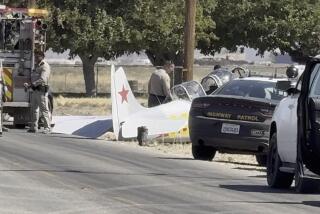Pilot, Co-Pilot Cited in Crash That Killed 70
- Share via
WASHINGTON — Federal investigators concluded Tuesday that the pilot and co-pilot of a Galaxy Airlines charter flight were so distracted by the plane’s heavy vibrations that they failed to follow basic flight procedures, leading to the crash last Jan. 21 that killed 70 people in Reno.
The three-member National Transportation Safety Board voted unanimously to cite the flight crew of the four-engine Lockheed Electra turboprop in the accident. No crew members and only one passenger survived.
Galaxy Airlines Flight 203, a so-called “gamblers’ special” flight, was carrying a group of weekend visitors back to Minneapolis when it crashed shortly after takeoff from Reno-Cannon International Airport. The plane had been airborne less than a minute when it hit the ground about 1 1/2 miles from the end of the runway, plowed through a recreational vehicles sales lot and caught fire.
Before the crash, the flight crew radioed the tower that the plane was experiencing severe vibrations and asked permission to return to the airport.
Safety board investigators maintain that the vibrations occurred when a small door on the aircraft wing, used by service personnel, was left open. In Tuesday’s ruling, the board listed the ground crew’s failure to close the door as a contributing factor to the accident.
Breakdown of Coordination
The board’s primary concern, however, focused on the pilot and co-pilot and their failure to concentrate on flying the plane when they became aware of the heavy vibrations. “This breakdown of crew coordination followed the onset of unexpected, severe vibration shortly after takeoff,” investigators said.
According to the board, the pilot, Capt. Allan Heasley, 49, was trying to fly the airplane at the same time he was trying to figure out the source of the vibration, instead of delegating responsibilities to other members of the crew. Heasley reduced power and the plane nearly stalled; by the time he called for a return to full power, it was too late.
The board also cited co-pilot Kevin Fieldsa, 27, saying he was talking to air traffic controllers when he should have been concentrating on monitoring critical airspeed and flight path data.
“It could have flown with the door open,” board Chairman Jim Burnett said of the plane, adding that the “the flight crew failed basically to fly the aircraft and to monitor the airspeed.” Officials of Galaxy, based in Fort Lauderdale, Fla., said they would have no comment on the ruling.
Several board members expressed some concern about a number of violations of Federal Aviation Administration safety rules involving Galaxy that were discovered after the investigation of the accident had begun. Although they said these violations were not specifically linked to the Reno crash, they contended that the airline did not operate in an environment conducive to safety.
More to Read
Inside the business of entertainment
The Wide Shot brings you news, analysis and insights on everything from streaming wars to production — and what it all means for the future.
You may occasionally receive promotional content from the Los Angeles Times.










